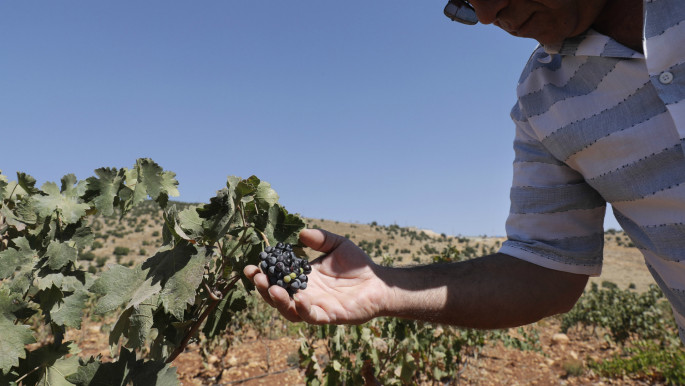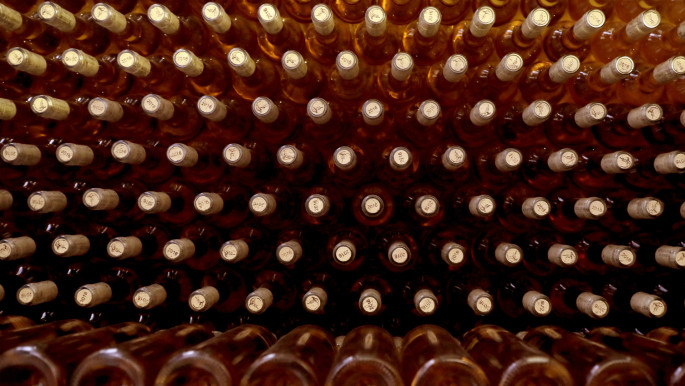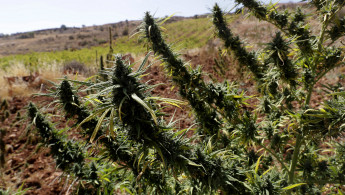Lebanon's 'fearful' weed farmers turn to lucrative wine business
The retired soldier was not alone in this illicit trade: cannabis fields used to stretch as far as the eye could see in this part of Lebanon, over which the state has tenuous control.
"Everyone used to grow hashish, that was what the market wanted, there was no alternative crop," Emad, a father of two in his fifties with neatly trimmed hair, said.
Now he and the 220 farmers from the Coteaux Heliopolis cooperative are growing grapes for winemaking in the northern Bekaa Valley's Deir al-Ahmar region.
The area, one of the poorest in Lebanon, is notorious for its cannabis production, which expanded massively over recent decades to turn into a multi-million-dollar industry.
While cannabis farming has only been feebly challenged by the authorities over the years, it remains illegal and the small cooperative has succeeded in luring some producers away from the risky business.
They are looking to cash in as Lebanon's wine industry has blossomed, with traditional heavyweights and myriad smaller producers making inroads on an ever-expanding global market.
"Growing grapes is more lucrative and leaves you with a clean conscience," Emad said, explaining that this year's nine-tonne harvest earned him $10,000 (8,400 euros), twice his erstwhile income from cannabis.
 |
| The first harvest in 2003 and the resulting windfall sparked a wave of interest among cannabis farmers in the area [AFP] |
Cannabis to Cabernet
On the other side of the dirt road running along his vineyard, the tall stems of cannabis fields are still visible.
Emad spent three years growing cannabis, like many other villagers in Lebanon's Bekaa who see it as their only means of survival.
The security forces regularly raid the cannabis farms in the area and Emad's fields were wiped out twice before he eventually decided to join the cooperative in 2003.
"With hashish you always feel threatened by the authorities, you can't sleep at night for the constant risk of being jailed or seeing the state destroy your crops," he said, puffing on a cigarette in the shade of a tree.
The Coteaux Heliopolis cooperative was launched in 1999 and now covers around 250 hectares of vineyard (620 acres) in Deir al-Ahmar.
The first harvest in 2003 and the resulting windfall sparked a wave of interest among cannabis farmers in the area.
"We have provided evidence that people don't want to grow hashish. They are obliged to because it is their only source of income but they don't actually want to live in fear and in violation of the law," said Shawki al-Fakhri, who heads the cooperative.
"If you give them an alternative, a lucrative and legal crop to farm, people will take it in a heartbeat," said the retired engineer, sitting in the garden of the house his grandfather built.
 |
| The cooperative has created its own winery and made a modest start with 100,000 bottles in 2017 [AFP] |
Historical land
The elegant sexagenarian with flowing white hair recounts with an amused grin how his own father had been tempted by cannabis farming decades ago but was eventually dissuaded by his grandfather, a village priest.
The cooperative's harvested grapes - around 400 tonnes in 2017 - are then sold on to producers such as Chateau Ksara, one of the biggest players in Lebanon's wine industry, or Domaine Wardy, one of the oldest and most renowned wineries.
The project initially received funding and technical support from France and gradually grew with local loans allowing producers to turn their fields into vineyards.
The grapes of choice are Syrah, Tempranillo, Cabernet Sauvignon, Sauvignon Blanc and Viognier.
"These are grapes that like the sun and the heat and could work at high altitude," said Charbel al-Fakhri, who works alongside his father Shawki at the cooperative and got a specialised MBA from France's wine capital Bordeaux.
The cooperative has created its own winery and made a modest start with 100,000 bottles in 2017, only a fraction of the eight million bottles Lebanon produces each year.
"I really believe our white is a little gem, its freshness is remarkable. We also have a very fresh and fruity red," said Charbel proudly.
For him, the switch from cannabis to wine is like returning a historical land to its rightful owner.
Coteaux Heliopolis chose its name as a homage to the nearby City of the Sun - Heliopolis was the name of the ancient city of Baalbek where the Roman wine god Bacchus was worshipped.
"The Romans didn't just happen to pick this place. We're 12 kilometres (seven miles) from Baalbek, once the area was covered with vines," the young man said. "Our land is exceptional."


![President Pezeshkian has denounced Israel's attacks on Lebanon [Getty]](/sites/default/files/styles/image_684x385/public/2173482924.jpeg?h=a5f2f23a&itok=q3evVtko)



 Follow the Middle East's top stories in English at The New Arab on Google News
Follow the Middle East's top stories in English at The New Arab on Google News


